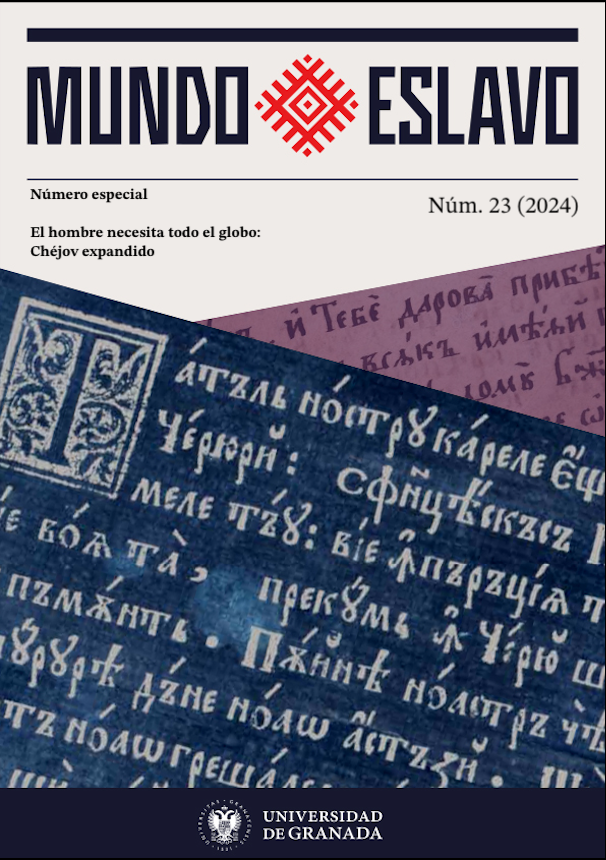The question of ethical responsibility in the fictional narrative "The fatal eggs" by Mikhail Bulgakov
DOI:
https://doi.org/10.30827/meslav.23.30630Keywords:
Bulgakov, The Fatal Eggs, fictional narrative, ethical responsibility, dystopiaAbstract
The question of responsibility regarding the application of scientific research findings extends not only to the scientist who makes a discovery and realizes its potential for practical application but also to those involved in implementing the discovery in practice. Bulgakov's prose "The fatal eggs" underscores these two lines of responsibility associated with ethical considerations. The researcher carefully evaluates potential risks, intends to adhere to precautionary principles, and first seeks to understand the exact mechanisms behind the remarkable results of their accidental discovery. However, the discovery is alienated from them when it falls into the hands of an implementer. This implementer, driven by haste, ideological simplicity, and impatience, fails to consider the principles of experimental work. The discovery, applied inadequately, hastily, and unprofessionally, is thus disqualified and irretrievably lost. Bulgakov's fictional narrative, with its dystopian atmosphere, serves as a poignant warning against unethical practices that can devalue a potentially significant invention, transforming it into an instrument of destruction rather than an asset.
Downloads
References
Bulgakov, M. A. (1989). Rokovye yayca (The Fatal Eggs). In: Bulgakov, M. A. Sobranije sochinenij v pyati tomach, t. II (Collected works in five volumes, vol. II.). Moskva: Khudozhestvennaya literatura, 43–116.
Frei, P. (1932). Wissenschaft und Technik. Eine zeitgemäβe Wisens- und Lebenslehre für jedermann (Science and Technology. A Contemporary Teaching of Knowledge and Life for Everyone). Frankfurt a. M.: H. Buchhold Verlagsbuchhandlung.
Haber, E. (1992). The Social and Political Context of Bulgakov’s ‘The Fatal Eggs’. Slavic Review, 51(3), 497–510.
Jonas, H. (1997). Princip odpovědnosti. Pokus o etiku pro technologickou civilizaci (Responsibility Principle. An Attempt at Ethics for a Technological Civilization). Praha: OIKOYMENH.
Laursen, E. (2012). An Electrician’s Utopia: Mikhail Bulgakov’s “Fateful Eggs”. The Slavic and East European Journal, 56(1), 56–70.
Muránska, N. (2003). Fantastická trilógia Michaila Bulgakova (Fantastic Trilogy by Mikhail Bulgakov). Nitra: Filozofická fakulta Univerzity Konštantína Filozofa v Nitre.
Nida-Rümelin, J. (1996a). Theoretische und angewandte Ethik: Paradigmen, Begründungen, Bereiche (Theoretical and Applied Ethics: Paradigms, Justifications, Areas). Angewandte Ethik. Die Bereichethiken und ihre theoretische Fundierung (AppliedEthics. Domain Ethics and Their Theoretical Foundation) (pp. 2–85). Stuttgart: Alfred Kröner Verlag.
Nida-Rümelin, J. (1996b). Wissenschaftsethik (Ethics in Science). Angewandte Ethik. Die Bereichethiken und ihre theoretische Fundierung (Applied ethics. Domain Ethics and their Theoretical Foundation) (pp.778–805). Stuttgart: Alfred Kröner Verlag.
Nudelman, R. (1989). Soviet Science Fiction and the Ideology of Soviet Society. Science Fiction Studies, 16(1), 38-66.
Ott, K. (1996). Technik und Ethik (Technology and Ethics). Angewandte Ethik. Die Bereichethiken und ihre theoretische Fundierung (Applied Ethics. Domain Ethics and Their Theoretical Foundation) (pp. 652–717). Stuttgart: Alfred Kröner Verlag.
Pešková, M. (2012). Idea „nového člověka“ v ruské literatuře 20. a 30. let 20. století (The Idea of the “New Man” in Russian Literature of the 1920s and 1930s). Plzeň: Vydavatelství ZČU v Plzni.
Tomašovičová J., B. Suwara (2023). Introduction. Transhumanism and Posthumanism in the Perspective of Biotechnologies (7–14). Bratislava: Veda.
Downloads
Published
How to Cite
Issue
Section
License
Copyright (c) 2024 Mundo Eslavo

This work is licensed under a Creative Commons Attribution-NonCommercial-ShareAlike 4.0 International License.

CC BY-SA: This license allows reusers to distribute, remix, adapt, and build upon the material in any medium or format, so long as attribution is given to the creator. The license allows for commercial use. If you remix, adapt, or build upon the material, you must license the modified material under identical terms.
CC BY-SA includes the following elements:
BY ![]() – Credit must be given to the creator
– Credit must be given to the creator
SA ![]() – Adaptations must be shared under the same terms
– Adaptations must be shared under the same terms
Authors who publish with this journal agree to the following terms:
1. Authors retain copyright and grant the journal right of first publication with the work simultaneously licensed under a Creative Commons Attribution License that allows others to share the work with an acknowledgement of the work's authorship and initial publication in this journal.
2. Authors are able to enter into separate, additional contractual arrangements for the non-exclusive distribution of the journal's published version of the work (e.g., post it to an institutional repository or publish it in a book), with an acknowledgement of its initial publication in this journal.
3. Authors are permitted and encouraged to post their work online (e.g., in institutional repositories or on their website) prior to and during the submission process, as it can lead to productive exchanges, as well as earlier and greater citation of published work (See The Effect of Open Access).













